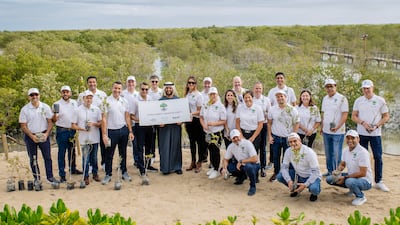With less than one month to go until Cop28, the eyes of the world are fixed on the UAE and its glittering skyline of five-star hotels.
But whereas the hospitality industry has traditionally drawn the awe and admiration of holidaymakers, it is under an increasing amount of scrutiny for its sizeable carbon footprint.
Tourism is responsible for 8 per cent of the world’s carbon emissions, according to Sustainable Travel International, a company that works with governments, businesses and nonprofits to provide sustainable travel opportunities. The majority of these emissions come from transport (49 per cent), with lodging responsible for 6 per cent, covering air conditioning, water heaters, lighting, kitchen appliances and more.
It’s estimated that a single hotel produces about 289,700 tonnes of waste globally each year, including 79,000 tonnes of food waste.
In the first seven months of this year, the UAE hosted about 16 million guests across its 1,224 hotels, according to Abdulla bin Touq Al Marri, the Minister of Economy and Head of the Emirates Tourism Council. With this amount of demand and supply, a huge effort is required to make travel sustainable – and the region’s hoteliers are increasingly giving eco initiatives the green light.
They are sweeping the industry, with hydroponic farms, EV charging stations and e-butlers in the works.
Turning air into water
In this year's Travel Trends Research study for the UAE and Saudi Arabia, Marriott International found that sustainability is now a big factor when it comes to travel plans.
In the UAE, 85 per cent of respondents said environmental considerations have some impact on their arrangements, while the number in Saudi Arabia reached 80 per cent.
To make sure it is meeting the expectations of eco-conscious guests, Marriott – which has 75 properties in the UAE, with 63,790 existing rooms and 52,790 planned by 2030 – has launched several initiatives, including ones related to water saving, renewable energy, food waste and community. This also includes turning hot air into drinking water.
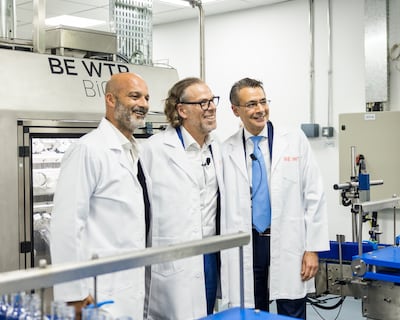
“The Delta Dubai Investment Park is working with a company to turn the humidity in the air around them into pure drinking water for guests,” says Sandeep Walia, chief operating officer of Marriott International in the Middle East.
“The AirOWater system project started in January and will generate 500 to 1,000 litres of water a day. The hotel currently has two AirOWater's Atmospheric Water Generators, enough to cover all the property's water needs across its operations.”
Other water initiatives include a bottling plant at W Dubai – Mina Seyahi, Le Meridien Mina Seyahi Beach Resort & Waterpark and The Westin Dubai Mina Seyahi Beach Resort & Marina, which provides fresh, filtered, bottled-on-site water to all guests, rooms and restaurants.
The collaboration with Swiss water company BE WTR is part of the group’s commitment to moving away from single-use plastics entirely by the end of the year and aims to remove 1.5 million bottles – or 1,000 tonnes – of plastic from annual operations.
At The Abu Dhabi Edition, a similar initiative was launched last year, with the capacity to produce 500 bottles of still and sparkling water a day at 500ml and one-litre capacities.
At the Marriott Resort Palm Jumeirah, meanwhile, water in guest rooms and the hotel spa is heated by banks of solar panels, with extra boosts provided by a heat pump, which also creates chilled water as a byproduct that is used for the air conditioning.
Food waste is another high priority on Walia’s agenda. In May last year, The Ritz-Carlton Dubai, JBR opened a vertical hydroponic farm growing crops all year round, yielding up to 10kg of fresh fruit and vegetables a day using 90 per cent less water than traditional farming techniques.
A second vertical farm at The Ritz-Carlton Abu Dhabi, Grand Canal is also in the works, with hopes of producing 12kg of produce per day. Up to 181kg of food scraps are also composted every month at The Ritz-Carlton Ras Al Khaimah, Al Wadi Desert.
The group’s most ambitious initiative is a mangrove forest of 12,000 trees planted in partnership with Etihad Airways covering 150 square kilometres on the Jubail Island coastline in Abu Dhabi, which aims to remove 6.4 billion tonnes of carbon dioxide from the air.
Turtle rehabilitation to AI tracking and e-butlers
For home-grown Jumeirah Hotels and Resorts – which has 13 properties across the UAE – the challenge of balancing sustainability with luxury is one the group takes seriously, with several initiatives under way and more in the pipeline.
Since 2004, the Turtle Rehabilitation Project has released more than 2,100 turtles into the sea, while highlighting the importance of biodiversity and plastic pollution.

“The hospitality industry has a crucial role to play in promoting responsible tourism,” says Bryanne Tait, group senior director of sustainability at Jumeirah Group.
“Our purpose as a global luxury hospitality company is to uphold sustainable and inclusive practices across our business, to shape the best possible future where everyone can thrive.”
Like Marriott, Jumeirah has invested in onsite water bottling plants and water filtration systems to provide safe drinking water in reusable bottles, removing up to nine million bottles from landfills and the ocean.
To tackle food waste, the group has implemented an AI tracking system across its hotels, leading to a 20-tonne reduction in Jumeirah Zabeel Saray alone last year – the equivalent of 50,000 meals saved. The system offers a solution to track and measure food being thrown away, so chefs can adjust accordingly.
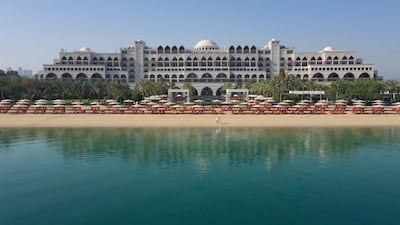
“Over the past year we have also been piloting onsite organic waste treatment, such as composters and digesters, to reduce food waste to landfill,” says Tait.
“This is waste which would otherwise convert to methane emissions with 25 times higher climate impact than CO2 emissions.”
And plans for the group’s future are even more ambitious. “We are implementing building management systems for energy performance and embracing digital solutions such as paperless check-in, virtual keys and e-butlers,” says Tait. E-butlers are used as a digital concierge, allowing guests to communicate with Jumeirah's teams via instant messaging, whether to request room service or book spa treatments, for example.
“We are also implementing software platforms to address sustainability in our supply chains and we have a comprehensive training programme to improve awareness, understanding and ultimately more sustainable action leading to impact.”
Eliminating plastic and food waste
Accor operates 68 properties in the UAE, including 71,820 rooms with 49,510 more to come by 2030. Hotels include Sofitel Dubai The Palm, Hyde Hotel Dubai and Fairmont Bab Al Bahr – Abu Dhabi, with each hotel devoted to sustainable practices.
On a global level, the group has committed to carbon neutrality by 2050 and has vowed to eliminate most single-use plastics from guest-facing areas by the end of this year.
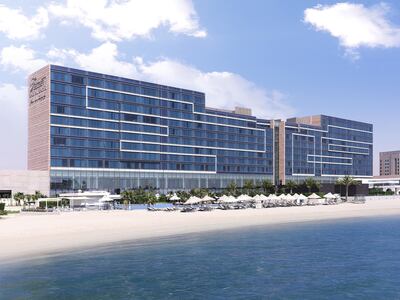
“In the UAE, 85 per cent of our properties have also successfully removed single-use plastic from their front-of-house operations,” says Accor chief Paul Stevens says.
Stevens says the group is also using AI to measure and reduce food waste. “In the UAE specifically, Accor is in the process of measuring an accurate food waste baseline for every hotel, with over 50 per cent of the portfolio in the country securing this already,” he adds.
“This will be used to establish efforts which need to be implemented at the property level to reach the global target of 60 per cent food waste reduction by 2030.”
All the UAE hotels under the Accor umbrella are also in the process of being certified by Green Key and Green Globe by the end of next year. This aligns properties with recognised sustainability standards across the world, including promoting recycling of materials and managing energy and water use, but also protecting culture and heritage in host destinations, respecting local cultures and incorporating policies of diversity and inclusiveness.
'The road to emissions intensity reduction is a continuous journey'
Last year, Hilton announced plans to reduce carbon emissions by 75 per cent from managed hotels and 56 per cent from franchised hotels by 2030.
In the UAE, where the hospitality group has dozens of properties under its banner, this has taken the form of the Green Breakfast initiative, which aims to reduce food waste across breakfast service, in collaboration with the UN, Winnow and ne’ma (The UAE National Food Loss and Waste Initiative).
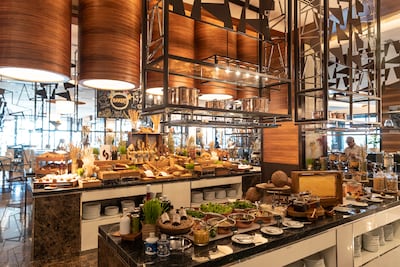
“Breakfast provides a unique opportunity to address food waste concerns, as it is the one unifying food and beverage experience in all hotels,” says Jean Garris Hand, vice president, Global ESG for Hilton.
“Hilton’s Green Breakfast aims to significantly reduce food waste across breakfast operations in 13 UAE-based hotels, effectively providing a blueprint for food waste management across the local hospitality industry.”
The launch follows the success of Hilton’s Green Ramadan campaign, which led to a 61 per cent reduction in post-consumer food waste across the brand’s properties in the UAE, Saudi Arabia and Qatar.
The pilot project started in August with the installation of production and plate waste systems across participating hotels, where baseline data was recorded and will be updated throughout the month.
Hilton says it has reduced its carbon emissions by 44 per cent since 2008 and will install up to 20,000 EV charging stations across its portfolio by 2025.
“The road to emissions intensity reduction is a continuous journey, and one that we expect to be on for many years beyond 2030,” says Hand.
“We’ve learned from the initial steps we’ve taken to date and will continue to use the latest climate science and technology advancements in the years to come to continue this journey.”
